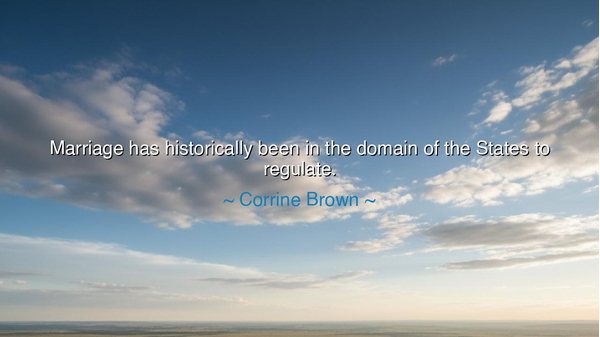
Marriage has historically been in the domain of the States to






Listen, O Children of the Future, to the words of Corrine Brown, who speaks with the weight of both history and legal tradition: "Marriage has historically been in the domain of the States to regulate." These words echo through the ages, carrying with them a truth as old as human civilization itself—the institution of marriage has long been a matter governed by the customs and laws of individual societies, rather than by central powers. For centuries, the marriage contract has been shaped not only by religious and cultural practices but also by the laws of the state, which have dictated the terms and conditions under which individuals may unite.
In the ancient world, the concept of marriage was deeply entwined with the local customs and tribal laws of each society. In Greece, Sparta and Athens had differing views on marriage—while Spartan women had greater independence, Athenian marriage was primarily viewed as a means of ensuring the continuation of the family lineage and securing political alliances. Each city-state had its own rules, and the state played a pivotal role in defining what was acceptable in marriage. Similarly, in Rome, the state had clear laws governing the legitimacy of marriages, inheritance, and family ties. Marriage was often not simply a personal contract but a political one—used to solidify alliances and secure power. This deeply state-controlled structure shows that the regulation of marriage has always been inextricably linked to the political needs of the society.
Brown's words underscore the modern reality that, while marriage has taken on a more personal and emotional aspect in our current time, its regulation has traditionally belonged to the local authority—the state. Whether in ancient Rome or modern-day America, the state has often been the authority that determined who could marry, under what circumstances, and with what social benefits. Marriage has always been seen as a legal contract, one that brings with it certain rights, responsibilities, and privileges, such as the ability to inherit property, claim spousal benefits, and have legal recognition in society. Just as the Romans recognized marriage as an important instrument in maintaining the order of society, so too does the modern state see marriage as an institution that shapes the very structure of society.
Consider the English common law, which long held that marriage was primarily a matter for church authorities until the 16th century. When Henry VIII sought to annul his marriage to Catherine of Aragon, the English monarchy sought to assert greater control over the institution of marriage, famously breaking with the Roman Catholic Church and establishing the Church of England. This marked a pivotal moment in history, where marriage transitioned from being exclusively a religious sacrament to a matter governed by the state. The state asserted its authority, determining the legal grounds for marriage and divorce, a shift that would ripple through history and influence the modern legal frameworks of many nations, including the United States.
In the United States, marriage has traditionally been governed by the states rather than the federal government. Each state has its own rules regarding who can marry, how marriage is validated, and the rights and responsibilities that arise from it. For much of the nation's history, states decided the age at which individuals could marry, whether marriage could be between same-sex partners, and other crucial aspects of the marriage contract. Even as the federal government became involved in matters such as taxation and civil rights, marriage remained largely a state-regulated institution, allowing for regional variations that reflected the different cultural, religious, and political beliefs of the people in each area.
This long-standing tradition of state control over marriage is not without its challenges. Marriage laws in the United States, as Brown points out, have evolved, particularly in the 21st century, as the nation grappled with issues like same-sex marriage. The legalization of same-sex marriage was a monumental shift, one that was initially determined by state courts and then upheld by the Supreme Court in Obergefell v. Hodges in 2015. This ruling brought marriage equality to all states, making it clear that while states have historically held the power to regulate marriage, there are fundamental rights that must be protected across all regions of the nation. This shift is part of a larger ongoing conversation about the balance between state sovereignty and the protection of individual rights.
The lesson, O Children, is this: Marriage, like many institutions, has been shaped by the local customs and laws of society. It is through the state's regulations that we have often seen the evolution of what is deemed acceptable, what rights are afforded to those who marry, and how these unions are recognized by the greater community. But as history teaches us, the regulation of marriage is not always a straightforward matter—it is a delicate balance between individual rights and state power, between the traditions of society and the evolving needs of a changing world.
In your own life, remember this truth: Laws change and societies evolve, but love, in all its forms, remains a powerful force that can shape the future. As you navigate the complexities of law and custom, always seek to understand the deeper values that guide your actions and the laws of your land. Respect the past, but question the present when justice requires it. And in the realm of marriage—as in all things—strive to ensure that the rights and dignity of all individuals are honored, and that the laws serve to build a more just and equitable world for future generations.






AAdministratorAdministrator
Welcome, honored guests. Please leave a comment, we will respond soon